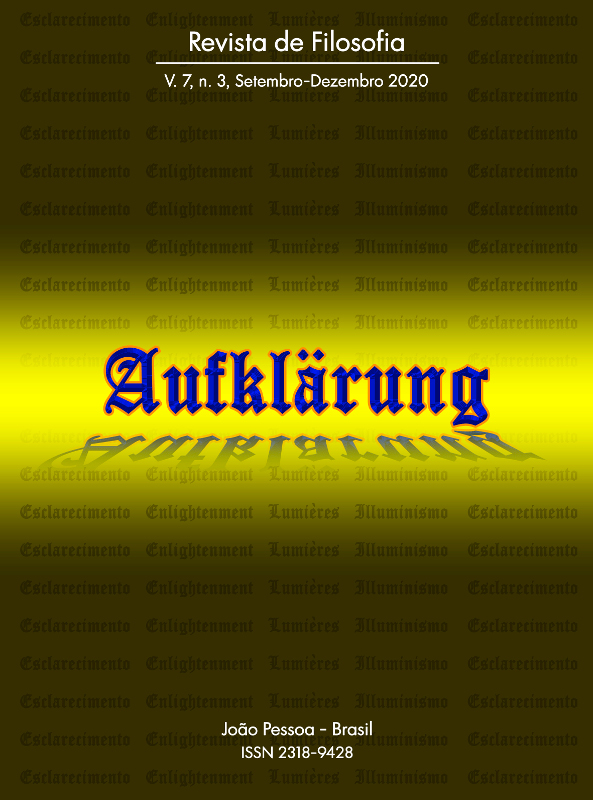Johann Gottlieb Fichte, education and interculturality
DOI:
https://doi.org/10.18012/arf.v7i3.57588Keywords:
education, cultures, interculturality, nationalism, public-privateAbstract
This research tries to perform a critical and comparative analysis of the educational proposal of the German philosopher Johann Gottlieb Fichte (1762-1814); who expresses a keen interest in education and politics, with the aim of recovering and liberating the German nation from foreigners. According to Fichte, an authentic education is that students must be removed from the world of adults to live in a purer residence, where they learn to live with honor and are able to invent machines and tools. Words and debate in the public space are not important. In contrast, Hannah Arendt's proposal is analyzed, who believes that all education should arouse citizen opinion and participation in the public space. The student must not be removed from the world to manufacture and sell (homo faber); On the contrary, he must learn to think for himself and act in concert. In this sense, contemporary discourses on interculturality, through a dialogue of knowledge, constitute an alternative of peace and harmony between different cultures.
Downloads
References
ARENDT, H. (2005). La vie de l’esprit, Paris: Puf.
ARENDT, H. (2002). La condition de l’homme moderne, Paris_: Gallimard.
BERISSO, D., & GIULIANO, F. (2015). La educación como práctica de convivialidad. Una conversación intercultural con Raúl Fornet-Betancourt, Revista del Cisen Tramas/Maepova, Argentina, vol 3, n. 1, pp. 139-151.
BOLIVAR, A. (2004). Ciudadanía y escuela pública en el contexto de diversidad cultural, México: R. M.
CORDOBA, M., VELEZ DE LA CALLE, C. (2015). La alteridad desde la perspectiva de la Transmodernidad de Enrique Dussel, Revista de Latinoamericana de Ciencias Sociales, niñez y juventud, Manizales, vol 14, n. 2, pp. 1001-1015.
DE SOUSA SANTOS, B. (2011). Las epistemologías del sur, Revista Internacional de Filosofía Iberoamericana y Teoría Social, Maracaibo, año16, n. 54, pp. 1-23.
DUSSEL, E. (2018). Siete hipótesis para una estética de la liberación, Praxis, Revista de Filosofía, México, n. 77, pp. 1-28.
DUSSEL, E. (2005). Transmodernidad e interculturalidad, interpretación desde la Filosofía de la Liberación. México. Disponible en: http://red.pucp.edu.pe/ridei/wp-content/uploads/biblioteca/090514.pdf.
ESTERMANN, J., & TAVARES, M. (2015). Hacia una interversidad de saberes: Universidad e interculturalidad, Sao Paulo, Revista Lusófona de Educação, v. 31, pp. 65-83.
ESTERMANN, J. (2013). Ecosofía andina: Un paradigma alternativo de convivencia cósmica y de Vivir Bien, Suiza, FAIA, v. 22, n. 9-10, pp. 1-21.
FICHTE, J. B. (1984). Introducciones a la doctrina de la ciencia (Trad. Alianza Editorial), Madrid: Sarpe.
FICHTE, J.B. (1977). Discursos a la nación alemana (Trad. Luis Acosta y María Varela), Barcelona: Orbis.
FORNET-BETANCOURT, R. (2016). La función cultural de la filosofía en tiempos de crisis. Problemata, Revista internacional de filosofía, Portugal, v. 7, n. 3, pp. 203-216.
FORNET-BETANCOURT, R. (2015). De la inculturación a la interculturalidad. Bremem. Disponible en: http://servicioskoinonia.org/relat/355.htm.
FOUCAULT, M. (1979). El orden del discurso, Barcelona: Tusquets.
GIOVANNI, R.; DAREIO, A. (1992). Historia del pensamiento filosófico y científico, Madrid: Herder.
GROVES, T. (2016). Paulo Freire, la educación de adultos y la renovación pedagógica. Revista Tendencias pedagógicas, México, n.27, pp. 1-16.
HANDELSMAN, M. (2019). Decolonizar demanda reaprender. Quito. Disponible en: https://www.elcomercio.com/tendencias/decolonizar-demanda-reaprender-michael-handelsman.html.
LEIVA, J. (2012). La formación en educación intercultural del profesorado y de la comunidad educativa. Revista Electrónica de Investigación y Docencia, Número monográfico (octubre), pp. 8-13, 2012.
LEVINAS, E. (2004). El tiempo y el otro, Barcelona: Paidós.
LOUZAO, M. (2019). Educación intercultural: de la urgencia cuantitativa a la exigencia democrática. Orientaciones para la investigación y la acción en el contexto educativo asturiano. Revista de Investigación en Educación, Oviedo, v. 17, n. 1, pp. 44-54.
LUCIO-VILLEGAS. (2015). Paulo Freire. La educación como Instrumento para la justicia social. Revista Internacional de Educación para la Justicia Social, Sevilla, v. 4, n. 1, pp. 9-20.
MARIN, M. A. (2013). La construcción de una ciudadanía intercultural inclusiva: instrumentos para su exploración. Arizona State University Arizona, Estados Unidos, v. 21, pp. 1-25.
SCHMITT, C. (2009). El concepto de lo político, (Trad, R. Agapito), Madrid: Tecnos.
SOUZA, J.F. (2007). La transición posmoderna, derecho y política, Paulo Freire en el tiempo presente, Xativa, 2007, v. 5, pp.223-263.
Additional Files
Published
How to Cite
Issue
Section
License
Copyright (c) 2021 Aufklärung

This work is licensed under a Creative Commons Attribution 4.0 International License.
Journal general policy
1.This journal works under a Creative Commons License aplied to online journals. That icence can be read in the following link: Creative Commons Attribution 4.0 International (CC BY 4.0).
2.Accordingly to this License, a)the journal declares that authors hold the copyright of their articles without restrictions, and they can archieve them as post-print elsewhere. b)the journal allow the author(s) to retain publishing rights without restrictions.
Metadata Policy for information describing items in the repository
1. Anyone may access the metadata free of charge at anytime.
2.The metadata may be re-used in any medium without prior permission, even commercial purposes provided the OAI Identifier or a link to the original metadata record are given, under the terms of a CC BY license refered for the Journal.







































